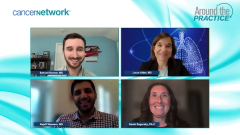
The Importance of Multidisciplinary Collaboration With Subspecialty Physicians in the Toxicity Management With Treatment
Panelists discuss how multidisciplinary collaboration with subspecialists, particularly dermatologists, is essential for managing cutaneous and other treatment toxicities associated with combination therapies like amivantamab and tyrosine kinase inhibitors, as dermatologists have become increasingly familiar with oncology-related toxicities and can provide specialized interventions when standard preventive measures fail, with access to academic medical centers offering additional expertise for complex cases.
Episodes in this series

This segment emphasizes the critical importance of multidisciplinary collaboration with subspecialty physicians, particularly dermatologists, for managing treatment-related toxicities associated with combination therapies for EGFR-mutant metastatic non–small cell lung cancer. The discussion highlights how dermatologists, even those practicing in community settings, have become increasingly familiar with oncology-related skin toxicities, particularly since the widespread adoption of immunotherapy. While these specialists may not be familiar with specific oncologic drugs, they have developed expertise in managing the resulting toxicities, which is essential when standard prophylactic measures fail to control treatment-related adverse effects.
The evolution of subspecialty support reflects the growing complexity of modern cancer treatment. As novel therapies like amivantamab and tyrosine kinase inhibitors become more ubiquitous, subspecialists across various disciplines have adapted to handle previously unfamiliar toxicities. This adaptation process mirrors what occurred with immunotherapy-related adverse events, where specialists learned to manage complications they had not previously encountered. The initial management typically occurs under oncology guidance, but as these toxicities become more common, subspecialists develop independent expertise in their management, creating a more robust support network for patients experiencing treatment-related complications.
Geographic proximity to academic medical centers provides significant advantages for toxicity management, offering access not only to second opinions from oncologists but also to highly specialized subspecialists who have developed expertise through collaboration with oncology departments. These academic-affiliated specialists often serve as local experts, becoming the preferred referral destinations for managing specific toxicities. This network of subspecialty support is particularly valuable for complex cases where standard interventions prove inadequate. The availability of experienced subspecialists who understand the unique challenges of oncology-related toxicities ensures that patients can receive comprehensive care that addresses both cancer treatment efficacy and quality of life preservation through effective adverse event management.
Newsletter
Stay up to date on recent advances in the multidisciplinary approach to cancer.




































